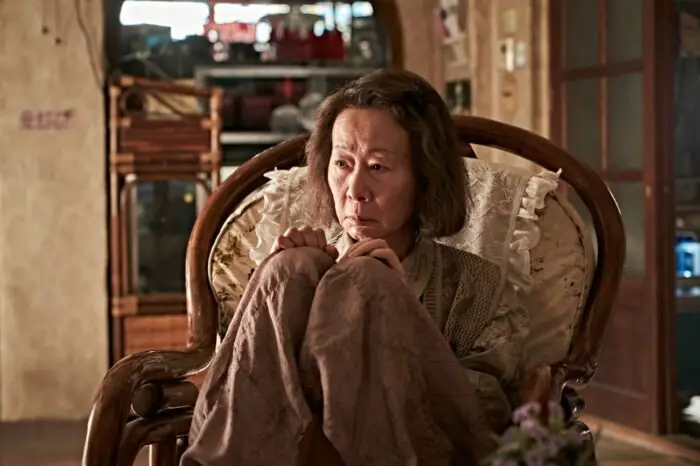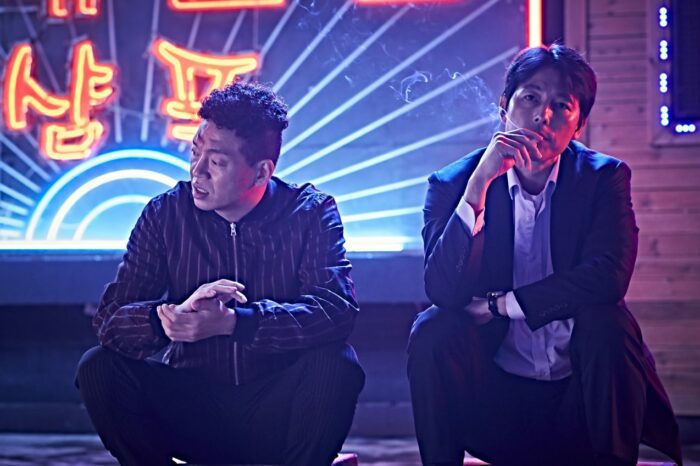All genres have their recognisable tropes, the familiar narrative devices that writers fall back on or take as their jumping off points when exploring a particular kind of terrain. When Kim Yong-hoon’s feature debut Beasts Clawing at Straws—an adaptation of Keisuke Sone’s novel Wara nimo sugaru kemonotachi—begins following a large satchel of money as an unseen figure places it in a bathhouse locker, it’s clear what kind of movie you’re likely to be in for. The Coen brothers’ genre crowing masterpiece No Country For Old Men may be the most seminal example, but the dark crime genre is rife with mysterious bags of currency passing between hands with fatal consequences.
Here, the discoverer of the bag is Joong-man (Bae Sung-woo) an employee at the sauna who finds the bag and discovers its contents. At first, he dutifully places it in lost property, before hesitating, and then moving it to the back, just a little out of sight. From here, the film begins interweaving the narratives of three characters, each in some way fitting the contemptuous description in the title, and they’re not the only ones. Joong-man is our everyman, a hard-working, timid, low income employee, struggling with his wife to support his family, including his hostile Alzheimer’s ravaged mother (play by Minari‘s newly crowned Oscar winner Youn Yuh-jung). We also have Mi-Ran (Shin Hyun-bin) a hostess living in fear of her well insured abusive husband, and Tae-young (Jung Woo-sung) an opportunistic and superstitious customs official left in deep debt to a violent local gangster when his girlfriend (a brilliantly predatory and seductive Jeon Do-yeon) disappears on him.
These parts are all well played and there’s a malicious glee to its dark humour, but it has to be said that on paper, it’s all fairly generic fare, with its population of unhinged thugs, duplicitous femme fatales, and bungling amateur criminals all inspiring a ‘seen-it-all before’ shrug. However, it’s in the interleaving of the stories that something special starts to happen. Primed by a century of simultaneous editing, our immediate instinct is that these stories are happening simultaneously, and soon our protagonists are going to cross paths, with the three stories climaxing together, but that’s not so. There’s a strict order to these stories and one of the film’s most intriguing pleasures is unpicking that, while the film uses this half-truth style of storytelling to execute some shocking and subversive rug pulls.

The extremely scattershot approach to storytelling does have its drawbacks though, with our characters all remaining rather one note and each tale having its longueurs and tributaries. Along the way we’re introduced to several characters who ultimately end up as red herrings (and inevitably dead herrings, our gangster’s sadistic henchman has a penchant for raw fish guts). How meaningful or otherwise our chosen protagonists contributions to the over-arching narrative ends up being eventually develops into a key thematic beat.
Characters who are generally deprived of agency end up making huge impacts on the story without realising, while others are bumped off just as it looks like they’re about to take the wheel, being added to the list of grim news stories that make up a sort of Greek chorus. The film often walks a thin line between being subversive and merely surprising, and its absurdist, often nihilistic and irony-laced attitude is something viewers will have varying levels of patience for. However, it does still have a beating heart deep down, and its one that the film sagely allows Yuh-jung to reveal, presenting a kind of thesis statement, albeit one that the film undercuts with its darkly humorous denouement.
The film’s ‘best laid plans’ approach to its story and themes plays out fairly well, though it doesn’t leave much room for the viewer to get terribly invested in the great game of crabs in a bucket played between each of its protagonists and their respective nemeses as they all pursue that elusive bag of cash. It’s a rarely gripping experience, one that Yong-hoon executes with a slightly more austere and remote style than one would have expected for a film of this genre. Nor does its indictment of human greed come off as terribly convincing, investing the viewer in neither the financial pressures on its characters, their aspirations of the better life money might provide them with, nor in who they are as people and the hope they might grow past such material concerns. Beasts Clawing at Straws purports to be a film about greed, but its stories don’t truly reflect that theme, as their protagonists are motivated more by external pressures like avoiding being killed by an unpredictable gang boss or ridding themselves of a violent partner.

There is something gruesomely compelling about material of this nature and the film’s attractive performances and ingenious plot construction do manage to breathe some new life into its more faded cliches. However, to make a tiresome comparison to Parasite, that film did manage to explore themes of aspiration and the violent extremes people will go to in order to achieve a better life, while also holding the audience in its teeth throughout with its rollercoaster ride of a story. In comparison, Beasts Clawing at Straws is relatively small fry.



